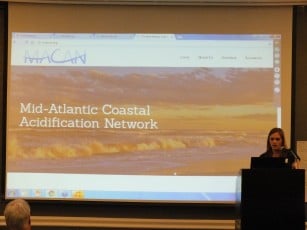After the launch of the Mid-Atlantic Coastal Acidification Network (MACAN) in the fall of 2016, the Network has been focusing on achieving its objectives, three of which were the primary focus during MACAN’s first workshop held on May 9, 2017 in Annapolis, MD. A full workshop summary is available here.
While all Network objectives were touched on during the workshop, the primary goals of the workshop were to work towards:
- Providing a forum to share best practices in monitoring and sample collection;
- Developing a list of regionally impacted species and identify regional research gaps; and
- Helping to implement the Mid-Atlantic Regional Ocean Action Plan Healthy Ocean Ecosystem Action 3 on Ocean Acidification.
The workshop itself had specific objectives developed to achieve workshop goals:
- To determine key stakeholder concerns and needs regarding impacts to estuarine, coastal, and ocean species and ecosystems in the Mid-Atlantic;
- To initiate development of a comprehensive monitoring plan (e.g. location of sampling sites, timing/intervals, types of sampling, etc.), building off knowledge of monitoring that currently exists, to further understand estuarine, coastal, and ocean acidification and its impacts in the region;
- To develop an initial list of regionally relevant species that may be vulnerable to acidification;
- To begin to identify key research gaps to be pursued by MACAN and its partners; and
- To identify additional information to be provided on the MACAN website.
The workshop began with a welcome by Network co-leads Kaity Goldsmith of MARCO and Grace Saba of the Mid-Atlantic Regional Association Coastal Ocean Observing System (MARACOOS). Dr. Beth Phelan from NOAA’s Northeast Fisheries Science Center then provided a presentation on the State of the Science in the Mid-Atlantic. This presentation grounded remaining conversations for the day in what is known about the impacts of acidification in the region, so that the remainder of the day could focus on the gaps in regional knowledge.
The bulk of the late morning and afternoon consisted of three breakout session periods for three topics. The topics were:
1. Monitoring Plan
2. Ecological Research Gaps
3. Stakeholder Concerns and Needs
Each breakout session was also supplemented by a flash talk presentation by experts in each field. The flash presentations included:
- “Monitoring in the Mid-Atlantic” by Dr. Grace Saba, Rutgers University and MARACOOS
- “Ecological Research Gaps Associated with Coastal Acidification” by Dr. Whitman Miller, Smithsonian Environmental Research Center
- “Stakeholder Needs and Concerns” by Daniel J. Grosse, partner and co-founder of Toby Island Bay Oyster Farm in Chincoteague Island, VA
These breakout sessions and flash presentations provided significant insight into how MACAN can work towards developing a) a robust Mid-Atlantic acidification monitoring plan, and b) research priorities for the region. MACAN used this insight to launch two new work groups to achieve each of these objectives. If you interested in being a member of MACAN please email info@MidACAN.org.

